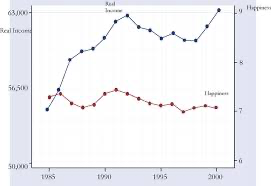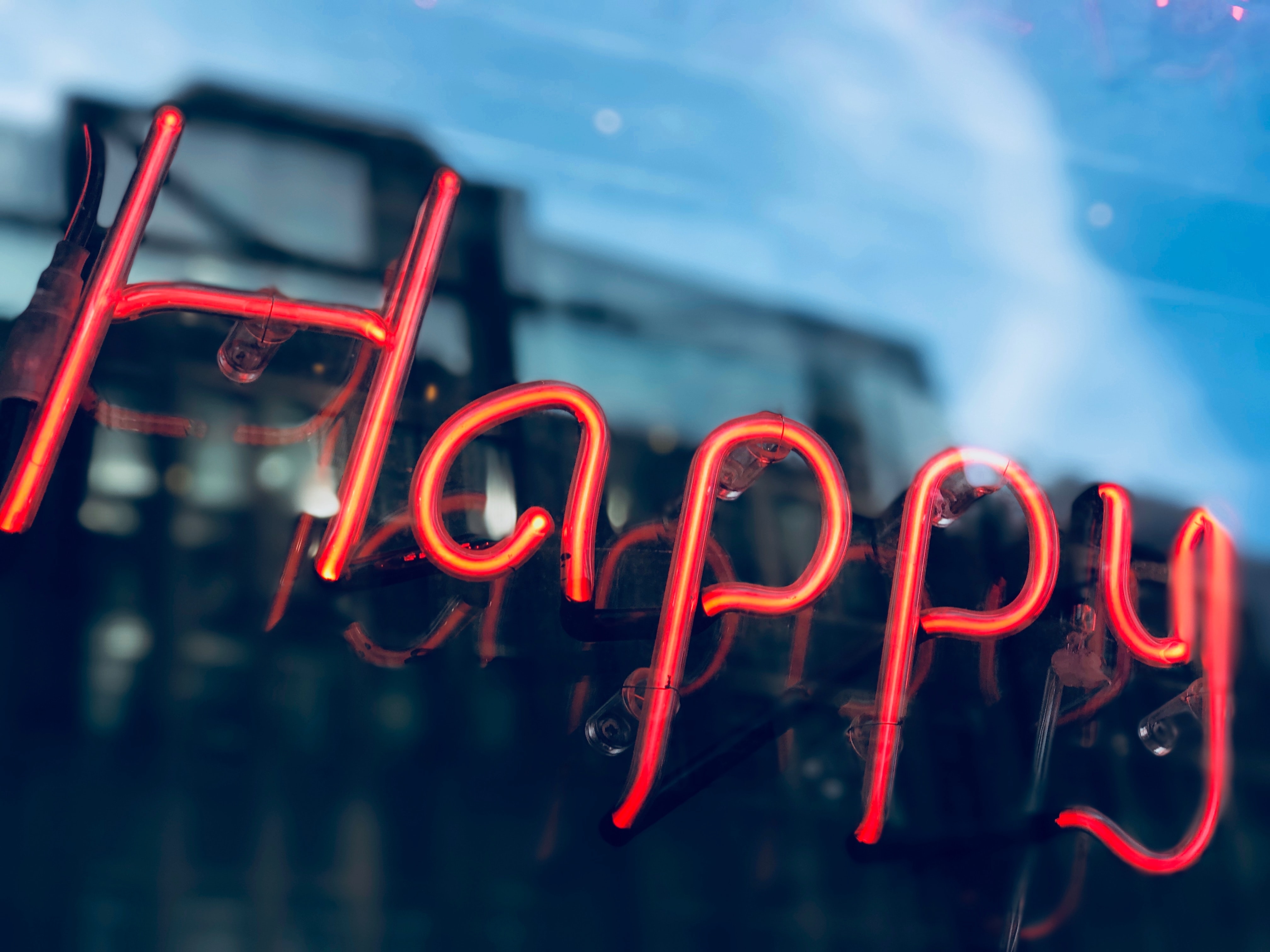While you remain locked down, now is the chance to reflect on life and change what is making you unhappy.
Happy people do things for others. Research shows that happy people spend more time with others, doing things for others and have a richer set of social connections than unhappy people. Even talking to a stranger on the street will boost your mood more than you expect. Social distancing is making this difficult on the one hand, but helping others and volunteering is still possible.
Doing something nice for others can increase your mood and also increase your feeling of social connection. This is especially true at this difficult time.

It is known as 'Miswanting' - the act of being mistaken about what and how much you like something in the future.
Our mind's strongest intuitions are often totally wrong.
Seeing is not believing

Look at the image on the left. Does the black line seem to line up with the blue line? In actuality, the black line is lined up with the red one.
They say "seeing is believing", but can you really trust what you see.
In the words of the renowned neuroscientist Dr Beau Lotto, “The brain didn't actually evolve to see the world the way it is. The brain has evolved to see the world it is useful to see".
Our minds just do not think in terms of absolutes. We think in 'relative terms.'
We use Reference Points
As humans, we use 'Reference Points'. A Reference Point is a salient (but often irrelevant) standard against which all subsequent information is compared.
We are constantly judging relative to stuff out there in the world, and it affects our judgement of what things we really care about.
Do you have the right Reference Points and are they making you happy?
What might have been

Picture: 1992 Summer Olympics
Research on counterfactual thinking has shown that people's emotional responses to events are influenced by their thoughts about "what might have been." It found a familiar occasion in which those who are objectively better off nonetheless feel worse.
As in the picture above in the 1992 Summer Olympics, Phelps - won the Gold medal - was Happy; Lazlo - won the Silver Medal (but his Reference Point was the Gold medal) - he was Unhappy; finally, Lochte - won the Bronze Medal (his Reference Point was not expecting to win any medal) - he was Happy.
An analysis of the emotional reactions of bronze and silver medalists at the 1992 Summer Olympics - both at the conclusion of their events and on the medal stand - indicated that bronze medalists tend to be happier than silver medalists. The authors attribute these results to the fact that the most compelling counterfactual alternative for the silver medalist is winning the gold, whereas for the bronze medalist it is finishing without a medal. It is about setting realistic Reference Points are achievable and attainable. Then remembering to congratulate yourself on the achievement. If not, then very quickly, it will affect your happiness and self-esteem.

Check your Reference Points now
Do your current Reference Points also affect your happiness judgements in your daily lives?
Research showed that if your actual income was £1; your required income would be £1.40. It shows that you are never happy with you lot.
Stop trying to keep up with the Joneses

Quite often, our reference point is where other people are at; what other people make; what other people do; what other people own. We compare ourselves to where other people are. It is such a wrong reference point. Set your own realistic goals and your own direction of travel.
Research by Clark and Oswald (1996) with 5,000 British workers showed that their job satisfaction dropped as their comparative income rose. If their co-workers had a higher salary, then they enjoyed the job less.
In another piece of research, students were asked which salary they would prefer:
Option 1
You get $50k, but others get $25k
Option 2
You get $100k, but others get $250k
Answer: 56% chose Option 1
Research also showed that for each hour/week of TV watching people spend an extra $4 per week in household spending.
Humans tend to prefer to have an oneupmanship over their peers, even if it means sacrificing a great reward. So stop trying to keep up with the Joneses and worrying about what they are doing. It is not going to make you happier.
Big Salaries do not make you happier
In Germany, this research showed that a bigger salary did not make the participants any happier.

Do not let envy ruin your happiness

Other research (on a 4-point scale) showed that women's mood was affected by looking at pictures of models.
- Rating before looking at models +2.36
- Rating after looking at models (after just a few minutes +2.07
Be happy with yourself and be yourself and not try to be somebody else. It will not make you happy.
How Happy is your Marriage?

Researchers also looked at data from a 15-year longitudinal study of over 24,000 individuals to examine the effects of marital transitions on life satisfaction. On average, individuals reacted to events and then adapted back toward baseline levels.

However, there were substantial individual differences in this tendency. Individuals who had higher slopes would actually increase in satisfaction over time.
Thus, marital transitions can be associated with long-lasting changes in satisfaction, but these changes can be overlooked when only average trends are examined.
This positive outlook for marriage is balanced; however, by the fact that some people’s satisfaction drops at a rate that is faster than average. Many of these individuals drop below baseline very quickly after marriage.
It is Time To Reset Your Reference Points

Take your time over the remaining period of the lockdown to reset your Reference Points across your whole life and set a goal to be Happy and focus on YOURSELF and the things that make you Happy. Choose the direction you want to travel in and how YOU are going to do it. Do not worry about others are doing.
These last few weeks and months have shown the whole world that life can be taken away from you very unexpectedly and very quickly. So use the remaining time to reset your Reference Points.
Be Happy!
Recommended Reading on being Happy
The How Of Happiness: A Practical Guide to Getting The Life You Want by Sonja Lyubomirsky
The Overspent American: Why We Want What We Don't Need by Schor, Juliet B. (1999) Paperback
Stumbling on Happiness (P.S.) by Daniel Gilbert
The How of Happiness: A New Approach to Getting the Life You Want by Sonja Lyobomirsky
 unknownx500
unknownx500








